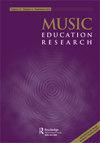Whiteness, interpellation, and embodied technique in western classical vocal pedagogy
IF 1.8
3区 教育学
Q2 EDUCATION & EDUCATIONAL RESEARCH
引用次数: 0
Abstract
ABSTRACT Criticism of the foundational whiteness of western classical music's socio-cultural heritage remains relatively rare, and the field continues to export a prestigious self-image of cultural and technical superiority. Building on Ben Spatz’ epistemology of practice, I argue that the foundational whiteness of western classical music is principally and most tenaciously embodied within its training and practices, and as such scholarly criticism must also address the transmission of embodied technique. I demonstrate how this foundational whiteness relates to philosophies of transcendence and mind-body dualism, focusing on the case of vocal pedagogy. I analyse pedagogical literature and methods to reveal racialised frameworks and powerfully interpellating practices that require student-practitioners to excise aspects of their identity as the price of entry to their field. In light of this, I propose moving beyond the tokenism that takes the field's superiority for granted, towards a more serious reckoning of its value.西方古典声乐教学中的白、诘问与体现技巧
摘要:对西方古典音乐社会文化遗产的基础白人的批评仍然相对罕见,该领域继续输出文化和技术优势的著名自我形象。在本·斯帕茨实践认识论的基础上,我认为西方古典音乐的基本白度主要且最顽强地体现在其训练和实践中,因此学术批评也必须解决具体技术的传播问题。我展示了这种基本的白色是如何与超越哲学和身心二元论联系在一起的,重点是声乐教育学的案例。我分析了教学文献和方法,以揭示种族化的框架和强有力的质询实践,这些框架和实践要求学生从业者将其身份的各个方面作为进入其领域的代价。有鉴于此,我建议超越将该领域的优势视为理所当然的象征主义,对其价值进行更认真的考量。
本文章由计算机程序翻译,如有差异,请以英文原文为准。
求助全文
约1分钟内获得全文
求助全文

 求助内容:
求助内容: 应助结果提醒方式:
应助结果提醒方式:


